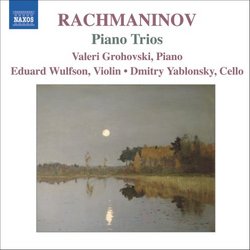| All Artists: Sergey Rachmaninov, Valeri Grohovski Title: Rachmaninov: Piano Trios Members Wishing: 0 Total Copies: 0 Label: Naxos Original Release Date: 1/1/2006 Re-Release Date: 12/12/2006 Genre: Classical Styles: Chamber Music, Historical Periods, Classical (c.1770-1830) Number of Discs: 1 SwapaCD Credits: 1 UPC: 747313242320 |
Search - Sergey Rachmaninov, Valeri Grohovski :: Rachmaninov: Piano Trios
 | Sergey Rachmaninov, Valeri Grohovski Rachmaninov: Piano Trios Genre: Classical
|
Larger Image |
CD Details |
CD ReviewsRachmaninov at his Melancholy Best J Scott Morrison | Middlebury VT, USA | 01/17/2007 (5 out of 5 stars) "Silly me! There was a time when I thought I didn't like Rachmaninov's second Trio élégiaque, Op. 9, because I'd heard it on the radio -- actually only part of it -- and thought it was sappy. It must have been due to either a terrible performance -- I can't recall who was playing it -- or more likely my frame of mind at the moment was not very receptive. At any rate, I have long since changed my mind about the trio and its older brother, the G minor trio written the year before in 1892 when Rachmaninov was only nineteen.
The main attraction here will probably be the longer and better-known second Trio, written in memoriam to Tchaikovsky who had recently died (in 1893; the trio was revised by Rachmaninov in 1907). Tchaikovsky had been very kind to Rachmaninov, having conducted the premiere of his 'The Rock' when Rachmaninov was still an unknown composer. The second Trio élégiaque takes Tchaikovsky's own similarly named Trio (written in memory of Tchaikovsky's mentor, Nikolai Rubinstein) as a sort of model. In three movements, the first is almost twenty minutes long (and some performers take longer than that) and is mainly based on a motif consisting of a minor chord followed by four descending chromatic notes. There is a second subject that disappears into the background except for a rather nice set of passages in the development section. But the main theme comes back in the recapitulation in which the strings are muted and the piano shines. Rachmaninov, of course, was an outstanding pianist so it is no surprise that the piano has some extremely virtuosic passages. This is particularly noticeable in the brilliant allegro scherzando section of the second movement. That movement is a theme and variations in which the theme is drawn from Rachmaninov's Tchaikovsky-premiered orchestral work, 'The Rock', but which is also similar to the variation theme of Tchaikovsky's own Trio élégiaque. The finale opens dramatically with typical Rachmaninovian two-handed chords but eventually evolves into a grief-stricken main section which then quietens to a mournful ending with muted strings and the piano singing a plaintive elegy. There is a temptation for performers to overdo the mournfulness of this trio by playing it too slowly. The present players -- Valeri Grohovski, piano; Eduard Wulfson, violin; and Dmitry Yablonsky, cello -- avoid that trap in giving us a heartfelt performance that nevertheless maintains a sense of the work's form with its attendant need for forward motion. This performance ranks up with the recordings of the Borodin Trio and the Moscow Rachmaninov Trio. The musicians are given clear, lifelike sound. The first Trio élégiaque is of a piece with the second. One is amazed at how this early work already sounds like the later music of Rachmaninov with which we are all familiar. In one movement, it is just shy of thirteen minutes long. It begins with a passage marked 'lento lugubre' with the piano dominating the otherwise sparse texture before allowing the violin and then the cello their moments in the sun. This is followed by a second subject initially given out by the piano which then leads to a rather livelier development section highlighting primarily the first subject. The movement concludes with a funeral march anchored by the big chords and arpeggios we so associate with Rachmaninov's later style. An amazingly assured work for such a young composer. It is given a convincing performance here. Scott Morrison" |

 Track Listings (4) - Disc #1
Track Listings (4) - Disc #1